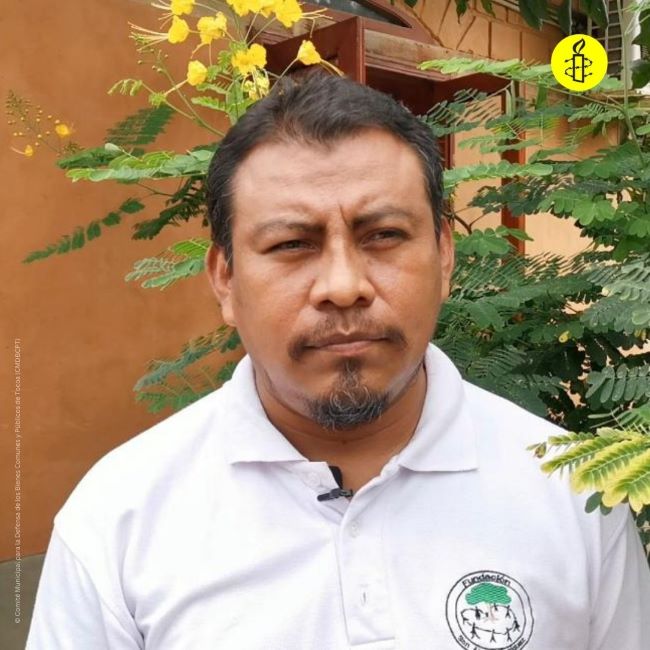The Honduran Congress is close to passing a dangerous new law. It would make it easier for companies to get environmental licenses without protecting human rights.
This bill does not include any mention of the right to a healthy environment. It also ignores people’s right to access information and take part in decisions that affect their lives.
Only one more vote is needed before the bill becomes law. That final vote could happen any day now.
Tell Honduran lawmakers to stop this bill. Urge them to protect the rights of all people not just business interests.
Here’s what you can do:
Write to the President of the National Congress of Honduras urging him to:
- Ensure that any changes to environmental legislation do not pose a risk to human rights.
- Abstain from passing the proposed bill until clear safeguards for human rights are included.
- Specifically, guarantee protections for public participation in environmental decisions.
- Uphold the right to a safe, clean, and healthy environment.
Write to:
Luis Rolando Redondo Guifarro
President of the National Congress of Honduras
Email: Lredondo@congresonacional.hn
X: @Congreso_HND @Lredondo
Salutation: Dear Luis Rolando Redondo Guifarro,
And copy:
Mr. Aldo Federico Rosales Espinoza
Minister-Counsellor & Chargé d’affaires, a.i.
Embassy of the Republic of Honduras
130 Albert Street, Suite 504
Ottawa, ON K1P 5G4
Tel: (613) 233-8900
Email: assistant@embassyhonduras.hn
A risky shortcut to environmental licensing
The Honduran Congress is considering a bill called the Special Bill for the Promotion of Investments through the Efficiency of Environmental Licensing Processes. This bill aims to speed up the approval of environmental licenses for investment and development projects. However, it is extremely broad and vague. As it stands, almost any project could qualify under the simplified process.
The major concern is that this shortcut could allow projects to skip the regular, more thorough environmental review. It also makes no mention of the State’s duty to uphold human rights, including the right to a healthy environment and public participation in decision-making.

Silencing communities
This bill does not include clear safeguards to ensure that people and communities can take part in decisions that affect them. It fails to address how projects could impact local rights, especially when it comes to water, land, and health.
This is not a new problem. For years, Honduran authorities have struggled to provide real protection for the environment and for the people who defend it. In February 2024, Congress passed Decree 18-2024 to protect all designated protected areas in Honduras and restore the original boundaries of Carlos Escaleras National Park in Colón. But this law has not yet been put into action.
Environmental defenders under threat
Environmental defenders in Honduras regularly report abuses linked to development projects. Many face threats, criminalization, and even death for speaking out. Honduras has the highest rate of killings of environmental defenders per capita in the world, according to Global Witness.
These attacks often happen in the context of land disputes, mining projects, and violations of the rights of Indigenous and Afro-descendant communities. One well-known case is the murder of Lenca leader Berta Cáceres in 2016. She was killed after opposing the Aguas Zarca hydroelectric project. In May 2024, several individuals were convicted of fraud and falsifying documents in connection with that case.
Another tragic case occurred on September 14, 2024, when environmental defender Juan López was killed. He had long denounced the harmful effects of a mining project in the Carlos Escaleras National Park. In May 2025, the Attorney General’s Office charged three people with illegal exploitation of natural resources and serious environmental damage. A separate criminal case is also underway against a municipal official accused of altering documents to push the project forward.
No guarantees, no accountability
Honduras is not a party to the Escazú Agreement, a key regional treaty that ensures access to environmental information, public participation, and justice in environmental matters.
Meanwhile, the current draft of the bill does not include any requirement for strong human rights assessments before granting licenses. It also fails to offer a plan to prevent environmental and social harm.
While there are reports that lawmakers may introduce amendments to exclude mining projects and guarantee free, prior, and informed consultation with Indigenous Peoples, those changes have not been made public. As of now, there is no mention of other key rights such as public participation.
Please take action as soon as possible until July 24, 2025. The UA will be duly updated should there be the need for further action.























